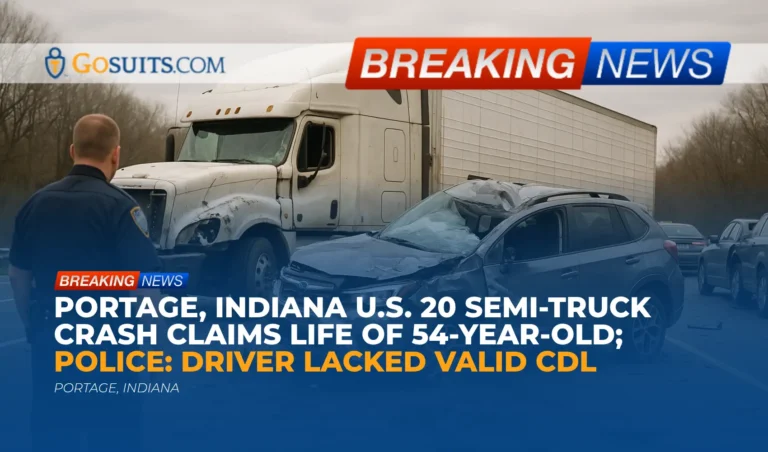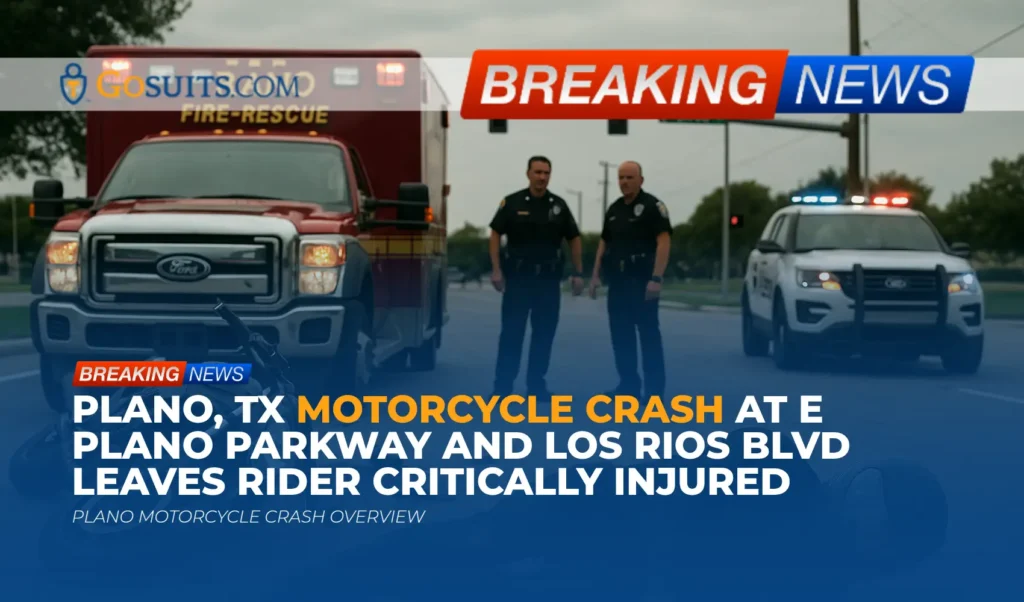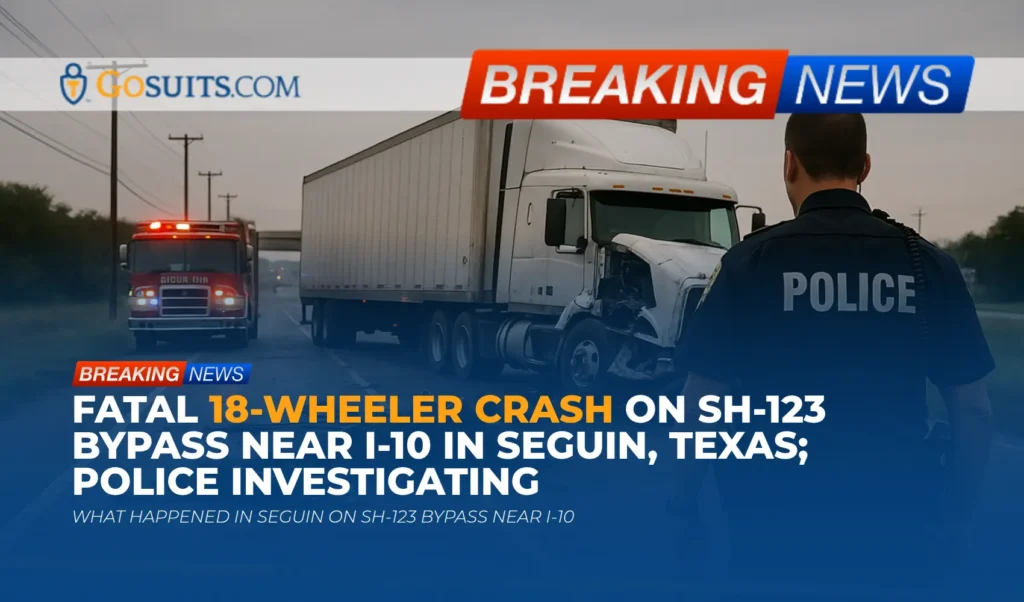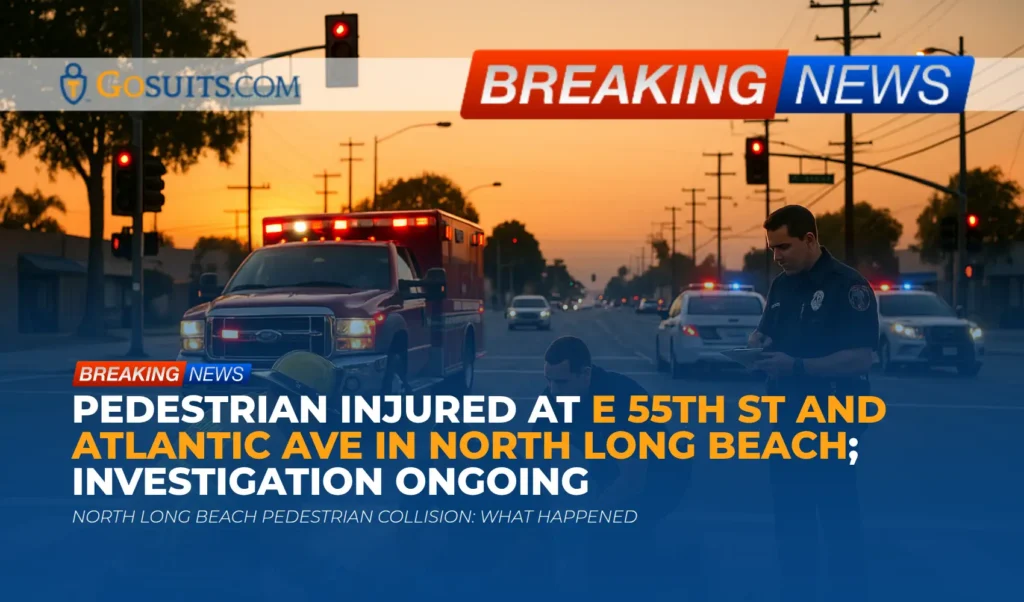- What happened on U.S. Highway 20 in Portage, Indiana
- Why these facts matter in a civil wrongful death claim
- Key steps to document the loss and preserve evidence
- Indiana wrongful death and survival claims overview
- Understanding insurance in commercial trucking crashes
- Community safety context and large-truck crash data
- Practical next steps people often take after a fatal crash
- Commentary from Gosuits Portage, Indiana Personal Injury Attorney
- Sources
What happened on U.S. Highway 20 in Portage, Indiana
According to statements reported by local authorities, a fatal multi-vehicle crash occurred on U.S. Highway 20 in Portage, Indiana. Police indicated that a semi-truck driven by an individual identified as Broko Stankovic was traveling toward stopped traffic and did not appear to slow before attempting a hard left turn into oncoming lanes. The truck struck a Subaru Crosstrek and then jackknifed into another vehicle. The 54-year-old driver of the Subaru died as a result of the collision.
Police further stated that the semi-truck driver did not possess a valid commercial driver’s license, was allegedly using a suspended Illinois CDL belonging to a family member, and was operating for a company that was not registered with the U.S. Department of Transportation. Following the crash, the driver was arrested, and authorities reported felony charges related to reckless homicide and criminal recklessness. An immigration detainer was also noted by police.
Location and timing
The collision was reported on U.S. Highway 20 in Portage, Indiana, in the vicinity of stopped traffic. The event was said to have occurred on a Wednesday, as referenced by police reports.
Vehicles and people involved
Law enforcement described a semi-truck as the initiating vehicle, with impact to a Subaru Crosstrek and a subsequent jackknife that involved at least one other vehicle. The driver of the Subaru, 54 years old, died due to the crash. Names of additional involved motorists were not publicly identified in the account reviewed.
Statements from law enforcement
Police statements highlighted three issues of public safety concern: failure to slow for stopped traffic, an abrupt evasive maneuver into opposing lanes, and serious licensing and registration irregularities. These reported circumstances can carry implications not only for criminal proceedings but also for civil liability, insurance coverage, and federal motor carrier compliance.
This article focuses on the civil and safety implications, the documentation families often need, and the general legal context that can apply after a fatal commercial vehicle crash.
Why these facts matter in a civil wrongful death claim
In a civil wrongful death case, the facts that investigators gather are crucial for determining who is responsible and what insurance coverage may apply. The items below are common factors considered in serious trucking collisions.
Potentially responsible parties
Responsibility in a commercial trucking crash can extend beyond the individual behind the wheel. Depending on evidence, potential parties may include:
- The driver, for negligent driving such as failing to maintain a safe speed, following too closely, or unsafe maneuvers.
- The motor carrier or trucking company, for negligent hiring, training, supervision, or for allowing or requiring operation without proper registration or safety management controls.
- Owner of the truck or trailer, if different from the carrier, for maintenance failures and entrustment issues.
- A broker or shipper, in limited circumstances, if evidence shows they exercised control or negligently selected an unsafe carrier.
- Maintenance providers, if mechanical failure linked to improper service contributed to the crash.
When authorities report that a carrier was not registered with the U.S. Department of Transportation or that the driver lacked a valid CDL, those facts may indicate violations of federal and state safety rules. Such violations can be important to proving negligence and establishing the scope of insurance coverage.
Trucking safety and licensing rules that may apply
Commercial motor carriers are subject to federal safety regulations that govern how they register, vet drivers, and operate. Some key rules and references include:
- USDOT number and carrier registration: Most carriers operating commercial vehicles of 10,001 pounds or more in interstate commerce must obtain a USDOT number and comply with Federal Motor Carrier Safety Regulations. See the Federal Motor Carrier Safety Administration overview at FMCSA: Do I need a USDOT Number?.
- Minimum insurance on file: Motor carriers must maintain minimum public liability coverage that varies by cargo and operation type. See FMCSA Insurance Requirements and 49 CFR Part 387 at the eCFR.
- Accident recordkeeping: Carriers must keep an accident register and certain crash-related records for at least three years. See 49 CFR 390.15 at the eCFR.
- Vehicle inspection and maintenance: Carriers must systematically inspect, repair, and maintain vehicles and keep records. See 49 CFR 396.3 at the eCFR.
- Hours of Service and driver records: Drivers are limited in driving hours and must keep compliant logs, often via electronic logging devices. See FMCSA Hours of Service.
Reports of an invalid CDL, use of another person’s license, and an unregistered carrier, if proven, can support claims that the driver and company did not meet essential safety requirements. In civil cases, these facts can help establish negligence and may influence how insurers assess coverage and liability.
Key steps to document the loss and preserve evidence
After a fatal crash, families and representatives often need to gather specific records, preserve physical evidence, and avoid mistakes that can harm a claim. Below are general steps people commonly consider.
Where to obtain official records in Indiana
- Police crash report: Indiana crash reports are typically available through the Indiana State Police Central Repository. Start with the crash reports page maintained by the State Police Central Repository Division at in.gov/isp. Local departments, such as the Portage Police Department, may also have a Records Division that can guide request procedures.
- Incident reports, photos, and 911 audio: Some items are subject to the Indiana Access to Public Records Act. Response times, redactions, and release policies vary. Requests may be made to the investigating agency, often the city police or county sheriff, consistent with state law.
- Autopsy or coroner findings: Coroners in Indiana operate under Indiana Code Chapter 36-2-14. Access to autopsy reports and related records can depend on status and statutory provisions. See Indiana Code 36-2-14 for general coroner duties and records considerations, and contact the county coroner’s office that handled the case.
- Death certificate: Certified death certificates can be requested through the Indiana Department of Health Vital Records. See Indiana Department of Health Vital Records for eligibility, required identification, and application instructions.
- Toxicology results: If testing was performed by the coroner or hospital, results may be available through official records processes. Access rules and timing vary by agency and statute.
- Truck and trailer records: Relevant records may include the carrier’s accident register, driver qualification file, hours-of-service logs, vehicle inspection and maintenance files, and load documents. Federal rules require carriers to keep certain materials for defined periods. See 49 CFR 390.15 and 396.3 at the eCFR.
Preserving vehicle and electronic data
Crucial evidence in a commercial crash can reside in the vehicles and company systems. Timely preservation can include:
- Vehicle preservation: Request that all involved vehicles, including the truck and passenger car, be stored without alteration so that qualified inspectors can document condition, crush profiles, lighting, and mechanical systems.
- Event data and telematics: Heavy trucks may carry engine control module data, air brake and ABS fault histories, and telematics or dash camera data. Electronic logging devices can contain hours-of-service and location information. Preservation letters should specify these sources.
- Company records: A formal evidence preservation notice to the motor carrier and any affiliated entities often identifies records like dispatch communications, bills of lading, driver logs, prior violations, and maintenance files. Federal recordkeeping rules set minimum retention periods, so prompt action is important. See 49 CFR 390.15 and 396.3 at the eCFR.
Insurance notifications and common pitfalls
- Consult an attorney before calling insurance: Insurance companies for trucking carriers often request recorded statements and authorizations quickly. Speaking with an insurer before obtaining legal guidance can affect later claims because statements may be used to limit or dispute liability and damages.
- Preserve all bills and records: Keep funeral, burial, medical, and counseling records. These documents can be important to the estate’s damages claim under Indiana law.
- Do not sign broad releases early: Early medical or record releases can open extensive private information to insurers. Narrow, time-limited authorizations are often preferred after reviewing them with counsel.
- Track deadlines: Indiana enforces strict filing deadlines for wrongful death and related claims. Missing a deadline can bar recovery regardless of fault. See the statute of limitations references below.
Indiana wrongful death and survival claims overview
Indiana has several wrongful death statutes that may apply depending on the decedent’s circumstances. The statutes govern who can file, what damages are available, and how funds are distributed.

Who may bring the claim
- General Wrongful Death Act: For most adult decedents, the personal representative of the decedent’s estate brings the claim. See Indiana Code Title 34, Article 23 for wrongful death provisions available at iga.in.gov.
- Adult Wrongful Death Act: Applies when an unmarried adult decedent leaves no dependents. This statute has specific limitations on recoverable damages. See Title 34, Article 23 at iga.in.gov.
- Child Wrongful Death Act: Applies to the death of a child as defined by statute and sets out distinct damages. See Title 34, Article 23 at iga.in.gov.
Types of damages commonly available
Subject to the applicable statute and evidence, recoverable damages may include:
- Final expenses: Funeral and burial costs.
- Medical bills related to the final injury: If applicable.
- Losses to dependents: The value of lost earnings and benefits to surviving dependents, where allowed.
- Loss of love and companionship: Allowed under some statutes, subject to statutory limits in certain adult cases.
- Administration and legal costs of the estate: Often recoverable under the general statute.
The specific statute controls both who can receive damages and whether certain categories, such as loss of love and companionship, are capped when the decedent is an unmarried adult without dependents. The Indiana Code provisions can be reviewed under Title 34, Article 23 at iga.in.gov.
Deadline to file
Indiana generally requires wrongful death actions to be filed within two years of the date of death. See the general personal injury statute of limitations at Indiana Code 34-11-2-4. Other specific deadlines can apply if the defendant is a governmental entity.
Claims involving government entities
If a governmental entity is involved, the Indiana Tort Claims Act imposes notice requirements and limits on damages. As of current statutory text, damages are capped per person and per occurrence, and timely notice is required. See Indiana Code 34-13-3-4 for damages limitations and Indiana Code 34-13-3 for procedural requirements.
Comparative fault considerations
Indiana follows a modified comparative fault system. A claimant’s recovery is reduced by their percentage of fault, and recovery is barred if the claimant’s share exceeds a threshold. See Indiana Code 34-51-2. In fatal crashes, fault allocation can involve multiple parties across several vehicles and corporate entities.
Understanding insurance in commercial trucking crashes
Insurance coverage in trucking cases can be complex. Policies may exist for the motor carrier, the tractor owner, the trailer owner, and other entities involved in logistics. Coverage questions often turn on federal filings and the nature of the trip.
Minimum financial responsibility requirements
- Public liability minimums: For interstate carriers transporting non-hazardous property in vehicles over 10,000 pounds, the federal minimum public liability coverage is typically 750,000 dollars. Higher minimums apply to certain hazardous materials. See FMCSA Insurance Requirements and the table at 49 CFR Part 387.
- Filing and registration: Insurers often file proof of financial responsibility with FMCSA. Whether a carrier has an active USDOT number and required filings can affect coverage arguments and negotiability of claims. See FMCSA registration overview.
Corporate structures and proving control
Some carriers operate with leased equipment or through owner-operators. Modern cases often examine who exercised control over the trip, dispatch, and safety policies. Bills of lading, dispatch communications, lease agreements, and driver pay records may be needed to determine which entity is responsible, and which policy applies. Federal rules and the realities of operational control can differ, so detailed discovery is often required.
Community safety context and large-truck crash data
Large trucks are essential to commerce, yet they present unique risks because of their weight and stopping distances. Federal safety efforts target braking performance, hours-of-service compliance, and oversight of carriers. National data illustrates the stakes: in 2021, federal statistics document thousands of fatalities in crashes involving large trucks nationwide. See NHTSA’s Large Trucks topic page at nhtsa.gov, and FMCSA crash facts at FMCSA Large Truck and Bus Crash Facts.
Although national trends cannot determine fault in any single Indiana collision, they underscore why compliance with licensing, registration, and maintenance requirements is critical. Allegations that a driver lacked a valid CDL or that a company operated without required DOT registration are not minor administrative issues. They can correlate with broader safety breakdowns that civil courts consider when assigning responsibility and damages.
Practical next steps people often take after a fatal crash
The items below summarize actions that can protect rights and help ensure a complete investigation. These steps are not directed to any specific person, and timing can be case dependent.
- Open or prepare to open an estate: A wrongful death suit is typically brought by a personal representative for the estate. Probate filings help establish authority to request records and pursue claims.
- Request official records promptly: Obtain the police crash report, any available scene photographs, and coroner documentation according to agency procedures. See Indiana State Police crash reports at in.gov/isp and coroner authority at iga.in.gov.
- Send evidence preservation notices: Direct written preservation requests to the motor carrier, truck owner, trailer owner, and any logistics companies identified on the bill of lading. Ask that ECM data, ELD logs, dash camera video, maintenance records, and accident registers be preserved. Cite 49 CFR 390.15 and 396.3 to highlight retention duties.
- Secure and inspect vehicles: If possible, coordinate secure storage and independent inspections before vehicles are altered or destroyed. Photogrammetry, crush measurements, brake components, lighting filaments, and tire conditions can all matter.
- Avoid recorded statements to insurers before legal guidance: What is said to an insurer can be used later to challenge liability or damages. Speaking with a seasoned attorney first helps ensure statements align with available evidence and protect statutory rights.
- Track deadlines and special notices: Note the two-year general limitation period in Indiana for wrongful death actions, and shorter notice requirements if a governmental entity is involved. See Indiana Code 34-11-2-4 and Indiana Code 34-13-3.
- Document losses: Keep records of funeral expenses, final medical bills, loss of household services, and impacts on dependents. These can be crucial to calculating damages permitted by Title 34, Article 23.
- Monitor regulatory history: If a carrier lacked a USDOT number or had compliance issues, that background can matter. FMCSA provides registration guidance and consumer reporting resources at fmcsa.dot.gov and safety violation reporting at Report a Safety Violation.

Commentary from Gosuits Portage, Indiana Personal Injury Attorney
Our hearts are with everyone affected by the loss reported on U.S. Highway 20. This discussion is intended to provide general information and education about the civil implications of a fatal trucking crash.
Based on what law enforcement described, several facts raise immediate civil-liability questions. If a semi-truck was operated without a valid CDL and the carrier was not registered with the U.S. Department of Transportation, those are serious safety red flags. In our experience with trucking cases, failures in licensing and registration often coincide with broader breakdowns in hiring, training, supervision, maintenance, or hours-of-service oversight. Thorough investigation should follow the paper trail, including maintenance files, dispatch communications, bills of lading, driver logs, and electronic data from the truck.
Insurance companies and corporations commonly move fast after a catastrophic crash. Adjusters may request broad medical authorizations and recorded statements, sometimes before all facts are known. That can put grieving families at a disadvantage. Insurers understand the interplay of federal filings, coverage exclusions, and comparative fault, and they can use early statements to limit responsibility or narrow the scope of damages.
An early, no-cost consultation can level the playing field. It allows a family to understand the process, the evidence that needs preservation, and the timelines that apply under Indiana’s wrongful death statutes. It also helps prevent missteps, such as giving a recorded statement or signing a sweeping release before the investigation is complete.
Sources
- FMCSA: Do I need a USDOT Number?
- FMCSA: Minimum Insurance Requirements for Motor Carriers
- eCFR: 49 CFR Part 387, Minimum levels of financial responsibility
- eCFR: 49 CFR 390.15, Assistance in investigations and accident registers
- eCFR: 49 CFR 396.3, Inspection, repair, and maintenance
- FMCSA: Hours of Service Regulations
- NHTSA: Large Trucks
- FMCSA: Large Truck and Bus Crash Facts
- Indiana State Police: Crash Reports
- Indiana Department of Health: Death Certificates
- Indiana Code 36-2-14, County Coroner
- Indiana Code Title 34, Article 23, Wrongful Death
- Indiana Code 34-11-2-4, Statute of limitations
- Indiana Code 34-13-3, Tort Claims Against Governmental Entities
- Indiana Code 34-51-2, Comparative Fault
Call-to-Action: Time-sensitive actions that protect civil rights after a fatal truck crash
Acting promptly can preserve critical evidence and clarify the path forward. The most impactful steps typically include preserving vehicles and electronic data, obtaining official records, and understanding deadlines before speaking with insurers. Early organization helps ensure that decisions are guided by facts rather than pressure.
- What to do now: Identify the investigating agency and request the crash report, notify interested parties to preserve vehicles and data, and gather essential documents such as funeral invoices and proof of dependents.
- Why urgency matters: Federal motor carrier records can be overwritten or destroyed with routine retention cycles, vehicles can be repaired or salvaged, and statutory deadlines begin running immediately. Waiting can mean losing key data that would otherwise demonstrate fault and damages.
- Where timing impacts outcomes: Preservation letters issued within days or weeks of a crash can secure ELD logs, engine control module data, dash camera video, and maintenance files. These materials can be central to understanding what happened and who is responsible.
- How to avoid avoidable risk: Delay in organizing the estate, missing notice requirements, or giving recorded statements to insurers without guidance can narrow options later. Carefully sequencing these steps minimizes preventable setbacks.
Preserve Evidence Checklist Understand Indiana Deadlines Learn About Trucking Insurance Rules






